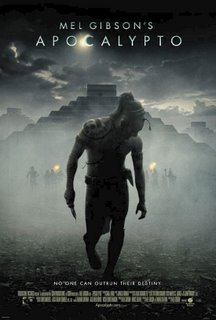
“Apocalypto” Enrages Leftist Elites
By David Paulin
Filmmaker Mel Gibson has touched off a controversy with his violent epic, “Apocalypto,” but it has nothing to do with long-standing charges that he’s anti-Semitic. Members of the high-minded left are accusing Gibson of “racism” and “cultural insensitivity” for his allegedly unfair portrayal of ancient Mayan civilization. Much of “Apocalypto” revolves around the Mayan's charming predilection for internecine violence and human sacrifices.
Interestingly, some of “Apocalypto’s” harshest critics have offered few substantive complaints about the accuracy of the film’s gruesome scenes. What’s made them positively livid is that Gibson has violated a taboo that’s central to multiculturalism – the prohibition against criticizing other cultures, especially
Violating this no-criticism taboo is serious stuff in the minds of dedicated multiculturalists. Consider the toxic effect that “Apocalypto” had on Maya groupie Julia Guernsey, an assistant professor in the Department of Art and Art History at the
This is not to say, to be sure, that the Mayans were Nazis, but consider some parallels. The Mayans carried out human sacrifices to appease their Gods – a perfectly logical reason for their bloodlust, when viewed from a morally neutral perspective. As for the Nazis, they undertook the Final Solution for logical reasons of their own – namely, to protect the Fatherland and its heroic values from the pernicious influence of Jewish intellectual and genetic degradation. Who are we to judge them? Obviously, cultural and moral relativism can lead to some pretty absurd extremes.
Garcia, for his part, also favors looking at the Mayans from a morally neutral perspective. The important thing for him is to understand the Mayan's point of view. To make this point, his review criticized one scene in which Gibson contemptuously “sums up all of Maya evil.” This was where “terrified sacrificial victims are lined up to have their hearts cut from their chests by a distinctly satanic priest garbed in feathers and paint and human bones, with claw-like fingernails and wild eyes,” he wrote.
Wounded Ethnic Pride
Another dimension of leftist outage over “Apocalypto” concerns Hispanic-Americans who feel the film has assaulted their “ethnic” pride. Roberto Lovato wrote in New America Media that “Apocalypto” left him “pondering the history of racism, pillage and apocalyptic war through my own blood and family history.”
“Like many Central Americans born and categorized as mestizos (mixed Indian and Spanish blood), I watched Apocalypto as someone who consciously revered the Maya and other indigenous groups while subconsciously prohibiting himself any real identification with them,” he explained.
How interesting that “Apocalypto” has engendered such feelings among some Americans of Hispanic descent. Why should they feel that way? It’s no doubt because they see themselves as Hispanic-Americans, and in this hyphenated identity they see themselves as more Hispanic than American.
A generation ago, such identify problems were rare. My family members who came through Ellis Island reinvented themselves as Americans. Our family name was Anglicized: Good riddance, Europe! Unfortunately, nobody these days says “Good riddance, Mexico!”
Precisely what put Mayan civilization into decline in southern Mexico and Central America is open to debate. But one theory argues that it contained the seeds of its own destruction. In the film’s opening scene, Gibson suggests this by citing a quote from historian and philosopher William James Durant: "A great civilization is not conquered from without until it has destroyed itself from within.”
Obviously, different people will see different messages in “Apocalypto.” Speaking at a film festival the ever controversial Gibson even drew some kooky parallels between the decline of Mayan civilization and America.
“Apocalypto,” on the other hand, also may reinforce the notion that not all cultures are equal, that America and the West are indeed the good guys – regardless of what the Maya-loving left may say. They demand “cultural sensitivity” of everyone except those who criticize America and Western culture.
After Gibson’s drunken anti-Semitic rant, I had little interest in seeing another of his pictures, especially after seeing “The Passion of Christ,” whose non-stop focus on Christ's torture had the feel of pornography. But given the kinds of people who hate “Apocalypto,” this is a picture I’m definitely going to see. It may just be a good antidote for these morally confused times.



